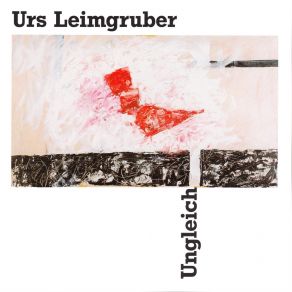Ungleich
Download links and information about Ungleich by Urs Leimgruber. This album was released in 1990 and it belongs to Jazz, Avant Garde Jazz, Classical genres. It contains 8 tracks with total duration of 56:45 minutes.

|
|
|---|---|
| Artist: | Urs Leimgruber |
| Release date: | 1990 |
| Genre: | Jazz, Avant Garde Jazz, Classical |
| Tracks: | 8 |
| Duration: | 56:45 |
| Buy it NOW at: | |
| Buy on iTunes $9.99 | |
Tracks
[Edit]| No. | Title | Length |
|---|---|---|
| 1. | Egonance A | 10:00 |
| 2. | Not Rueckwaerts | 5:39 |
| 3. | Ungleichchgewicht | 10:50 |
| 4. | Egonance B | 8:37 |
| 5. | Entre | 5:35 |
| 6. | Tenir Tête | 8:13 |
| 7. | Prélude Pour L. | 3:51 |
| 8. | Estidian | 4:00 |
Details
[Edit]On the follow up to his amazing Statement of an Antrider, reed genius Urs Leimgruber chooses to record five more solo compositions for tenor, soprano, and "prepared" bass saxophones. Leimgruber is as adventurous as Anthony Braxton is in his exploration of microtonalities on his chosen instruments. He careens through different tones, modalities, nuances, interval; investigations and one would think meditations on sonority in these exercises. And unlike many of his peers who claim to seek the same things, there is order in Leimgruber's world he treats the world of sound as he would any other recognizable system with respect for its natural order and origins. Perhaps this is why he is so effective as an improviser — his approach to his instrument is to extract from it a response that is congruent to what he put in. Bass god Adelhard Roidinger joins Leimgruber on three selections. Roidinger's a master of his instrumental technique — whether he is bowing sonances in response to Leimgruber's long, silvery soprano lines, or playing counterpoint to his bass saxophone extrapolations. There are notions of jazz here in both the American and European uses of the word, and certainly the improvisation in play comes from Leimgruber's long involvement with the new music universe that has long struggled to maintain its unique identity. Both of these facets lend to his original voice. Judging by this recording, this is an improviser who can walk the knife's edge of the extreme and the accessible with ease, and it's easy to hear why: There is no academia in Leimgruber's approach. His playing comes from somewhere other than the brain; it comes from the worlds of sound and silence and the heart of the horns themselves. Bravo.